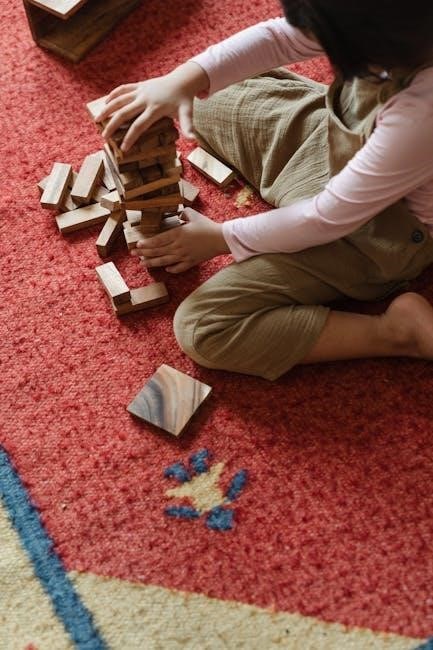
Discover the Where Should We Begin card game, designed by Esther Perel, which fosters meaningful conversations and storytelling․ Perfect for couples, friends, or family, it encourages deep connections and personal growth through thought-provoking questions and shared experiences․
Overview of the Game and Its Purpose
The Where Should We Begin card game is a thoughtfully designed tool to spark meaningful conversations and foster storytelling․ Created by Esther Perel, it aims to deepen connections between players by exploring personal experiences and emotions․ The game is structured around three core elements: Story Cards, Prompt Cards, and tokens, which guide participants through a journey of self-reflection and shared discovery․ Its purpose is to encourage vulnerability, empathy, and understanding, making it ideal for couples, friends, and family․ The game’s accessible format, including a free downloadable PDF, ensures that anyone can easily join in and benefit from its transformative power to ignite profound discussions and strengthen relationships․
Creator: Esther Perel and Her Vision
Esther Perel, a renowned Belgian psychotherapist and author, created the Where Should We Begin card game to bring storytelling and playfulness into relationships․ Her vision was to design a tool that fosters deeper connections and understanding through meaningful conversations․ Drawing from her extensive experience in couples therapy and her popular podcast, Perel crafted the game to encourage vulnerability, empathy, and self-reflection․ The game reflects her belief in the transformative power of sharing stories and exploring emotions․ By making the game accessible, including a free downloadable PDF, Perel ensures that everyone can benefit from its unique approach to strengthening relationships and personal growth․
Key Components of the Game

The Where Should We Begin card game comprises three essential elements: Story Cards, Prompt Cards, and tokens․ The Story Cards contain intriguing narratives designed to spark curiosity and introspection, while the Prompt Cards offer open-ended questions that guide players into deeper conversations․ Tokens, reminiscent of those used in games like backgammon, add a playful element, helping players navigate turns and keep track of progress․ Together, these components create a dynamic and engaging experience, making it easy for players to explore new topics and connect on a meaningful level․ The game’s structure ensures that each session is both structured and flexible, accommodating a variety of preferences and conversation styles․

Game Mechanics and Structure
The game revolves around taking turns, using Story Cards and Prompt Cards to guide conversations, while tokens manage turns and progress, ensuring a balanced and engaging experience․
Story Cards: Design and Function
The Story Cards are central to the game, designed to spark meaningful conversations and storytelling․ Each card features a unique question or prompt, carefully crafted by Esther Perel to explore themes like relationships, childhood, and future aspirations․ The cards are visually distinct, with a clean design that focuses attention on the content․ Players draw cards and share personal anecdotes, fostering connection and understanding․ The questions are open-ended, encouraging players to delve into their experiences and emotions․ The cards are divided into categories, making it easy to tailor the game to different groups or moods․ Tokens are used to manage turns, ensuring everyone has a chance to share․ This structure creates a balanced and engaging experience, making storytelling accessible and enjoyable for all players․
Prompt Cards: Role in Sparking Conversations
Prompt Cards play a vital role in guiding and deepening conversations within the game․ Designed by Esther Perel, these cards feature specific, thought-provoking questions that encourage players to explore their thoughts, feelings, and experiences․ Each card is crafted to follow up on stories shared, helping to uncover new insights and connections․ The prompts are open-ended, allowing for a wide range of responses and fostering a sense of curiosity and engagement․ By using these cards, players can delve into topics they might not have considered before, creating a safe space for vulnerability and understanding․ The prompts are balanced with storytelling elements, ensuring conversations remain dynamic and meaningful․ This design makes the game an effective tool for building stronger relationships and fostering personal growth through shared dialogue․
tokens: Their Significance in Gameplay
Tokens are an essential element in the gameplay of “Where Should We Begin,” serving as a tool to guide and manage interactions․ These tokens, reminiscent of those in backgammon, are used to track progress, indicate turns, and add a tactile dimension to the experience․ They help players navigate the flow of the game, ensuring that conversations remain structured and balanced․ By assigning tokens to specific actions, such as starting a story or asking a follow-up question, the game encourages active participation and accountability․ This simple yet effective mechanic ensures that every player has the opportunity to contribute, fostering a sense of equality and engagement․ The tokens also act as a visual reminder of the game’s rules, helping to keep the dialogue focused and meaningful․ Their presence enhances the overall experience, making it both organized and enjoyable for all involved․

Benefits of Playing “Where Should We Begin”
Playing “Where Should We Begin” enhances storytelling skills, improves communication in relationships, and fosters personal growth through meaningful conversations and self-reflection․ It deepens connections and understanding among players․
Enhancing Storytelling Skills
The “Where Should We Begin” card game is a powerful tool for enhancing storytelling skills․ By sharing personal experiences and anecdotes, players develop confidence in expressing themselves․ The game’s structured format, with story cards and prompts, guides individuals to craft compelling narratives․ Players learn to articulate thoughts clearly and engage audiences emotionally․ This fosters creativity and encourages participants to explore their unique voice; Over time, the game helps individuals become more adept at conveying their stories, making it a valuable resource for personal and relational growth․ The free PDF version of the game questions provides easy access to these storytelling exercises, ensuring everyone can benefit from improved communication and self-expression․
Improving Communication in Relationships
The “Where Should We Begin” card game excels at improving communication in relationships by encouraging open and honest dialogue․ Players engage in meaningful conversations, exploring topics that deepen understanding and empathy․ The game’s structured questions and storytelling elements create a safe space for vulnerability, helping partners or friends connect on a profound level․ Regular play fosters active listening and reduces misunderstandings, strengthening bonds․ The free PDF version of the game questions makes it accessible for everyone to enhance their communication skills, leading to healthier and more fulfilling relationships․ This tool is particularly effective for couples seeking to reignite intimacy or resolve conflicts through constructive conversation․
Fostering Personal Growth and Self-Reflection
The “Where Should We Begin” card game is a powerful tool for fostering personal growth and self-reflection․ By sharing stories and engaging with thought-provoking questions, players gain deeper insights into their own thoughts, feelings, and experiences․ The game encourages vulnerability, helping individuals confront their fears, desires, and aspirations in a supportive environment․ The free PDF version of the game questions makes it easy for anyone to access this transformative experience․ As players reflect on their responses, they develop a greater understanding of themselves and others, leading to emotional growth and a stronger sense of self-awareness․ This makes the game not only a fun activity but also a meaningful journey of self-discovery․

How to Play the Game
To play “Where Should We Begin,” start by printing and preparing the free PDF version of the game․ Shuffle the Story Cards and Prompt Cards separately, then deal a few to each player․ Players take turns drawing a Story Card and sharing a personal anecdote or experience related to the card’s prompt․ The facilitator uses Prompt Cards to guide the conversation deeper․ Tokens are used to track turns or encourage participation․ Set a timer for each turn to maintain pace․ Encourage open-ended questions to expand discussions and ensure all players feel comfortable sharing․ The game is ideal for small groups, fostering meaningful connections and storytelling․
Step-by-Step Guide for Beginners
Print and prepare the free PDF version of the game, cutting the cards as instructed․ Shuffle the Story Cards and Prompt Cards separately․ Deal 3-5 cards to each player․
Choose a facilitator to guide the session․ Set a timer for 5-7 minutes per turn to maintain a steady pace․
The first player draws a Story Card and shares a personal story inspired by the prompt․ Encourage honesty and vulnerability․
After the story, the facilitator uses a Prompt Card to ask follow-up questions, deepening the conversation․
Other players can use tokens to indicate their desire to ask questions or share related experiences․
After the timer goes off, the next player takes their turn․ Rotate roles and ensure everyone has a chance to share․

End the round by reflecting on key insights or moments of connection․ Rotate the facilitator and repeat the process․
Keep the atmosphere relaxed and judgment-free to foster meaningful interactions․ This structure ensures a balanced and engaging experience for all participants․
Time Management and Turn-Taking

Effective time management is crucial for a smooth experience with the Where Should We Begin game․ Set a timer for 5-7 minutes per player to ensure each person has ample time to share their story․ The facilitator should guide the session, starting with the first player drawing a Story Card and sharing a personal anecdote․ After the story, the facilitator uses a Prompt Card to ask follow-up questions, deepening the conversation․ Players can use tokens to signal their desire to ask questions or share related experiences․ Once the timer expires, the next player takes their turn, maintaining a balanced and engaging flow․ This structured approach ensures everyone participates and the game remains lively and focused, fostering meaningful connections and insights․
Expanding Conversations with Open-Ended Questions
Open-ended questions are the heart of the Where Should We Begin game, designed to spark meaningful dialogue and avoid yes/no answers․ These questions encourage participants to share personal stories, thoughts, and emotions, fostering deeper connections and insights․ Players are prompted to elaborate on their experiences, creating a safe space for vulnerability and understanding․ To maximize engagement, encourage active listening and avoid interrupting․ Follow-up questions can delve further into their responses, enriching the conversation․ This approach not only strengthens relationships but also helps players gain new perspectives about themselves and others․ By embracing open-ended inquiries, the game transforms ordinary discussions into profound moments of connection and self-discovery, making it a valuable tool for personal growth and relationship building․

Downloading the “Where Should We Begin” PDF
Download the free Where Should We Begin PDF from Esther Perel’s official resources or trusted sites․ This game fosters meaningful conversations and storytelling, perfect for enhancing connections and personal growth․
Where to Find the Free PDF Version
To access the free Where Should We Begin PDF, visit Esther Perel’s official website or trusted platforms like Reddit and online forums․ Ensure you download from reliable sources to avoid unauthorized content․ The PDF includes all essential game components, such as story cards, prompt cards, and instructions, allowing you to print and prepare the materials easily․ This resource is ideal for enhancing your gameplay experience and fostering meaningful conversations with friends, family, or partners․ Make sure to verify the authenticity of the source before downloading to ensure quality and safety․

Printing and Preparing the Game Materials
Once you’ve downloaded the free PDF, printing and preparing the game materials is straightforward․ Print the cards on high-quality cardstock for durability and a professional feel․ Cut the cards evenly, ensuring they are easy to handle during gameplay․ Organize the story cards, prompt cards, and tokens into separate piles or categories for quick access․ Consider laminating the cards for long-term use and to protect them from wear․ Consider storing the materials in a small box or pouch for convenient storage and transport․ Make sure to review the instructions included in the PDF to understand how to assemble and use each component effectively․ Proper preparation ensures a smooth and enjoyable gaming experience for all participants;

Additional Resources and Tools
- Esther Perel’s podcast offers deeper insights into relationships and storytelling․
- Join online forums like Reddit to share experiences and tips․
- Customize the game with editable PDFs for personalized questions․
Esther Perel’s Podcast: “Where Should We Begin”
Esther Perel’s podcast, “Where Should We Begin”, offers a unique glimpse into real couples’ therapy sessions, exploring intimacy, conflict, and connection․ Each episode dives into the complexities of relationships, mirroring the themes of her card game․ Listeners gain insights into communication strategies and emotional intelligence, which can enhance gameplay and conversations․ The podcast serves as a complementary resource to the game, providing deeper understanding and inspiration for meaningful discussions․ It’s a valuable tool for anyone looking to enrich their interactions and foster empathy, both in and out of the game․ By combining the podcast with the card game, players can create a holistic experience for personal and relational growth․
Online Communities and Forums for Players
Online communities and forums dedicated to “Where Should We Begin” provide a space for players to share experiences, tips, and resources․ Platforms like Reddit and Facebook host groups where users discuss the game, exchange stories, and offer advice․ These forums are invaluable for accessing free PDF versions of the game questions, as well as customizable templates and expansions․ Players often share their favorite prompts and strategies, fostering a sense of connection and collaboration․ Additionally, these communities allow users to connect with others who share similar interests, creating a supportive environment for deeper conversations and personal growth․ By joining these forums, players can enhance their gameplay and stay inspired to continue exploring meaningful interactions․
Editing and Customizing the Game Questions
Players can customize “Where Should We Begin” by editing the game questions to suit their preferences or group dynamics․ The free PDF version allows users to modify or add questions, making the game more personalized and engaging․ Online tools and downloadable templates enable easy editing, ensuring the game remains fresh and relevant․ For instance, players can incorporate inside jokes, specific themes, or topics relevant to their relationships․ This feature fosters creativity and tailors the experience to individual or group needs․ Customizing questions also encourages players to delve deeper into meaningful conversations, enhancing the game’s impact and making it a unique tool for connection and growth․ This flexibility is a key aspect of its appeal, allowing users to adapt the game to their evolving interests and goals․
“Where Should We Begin” offers a transformative way to deepen connections through storytelling and reflection․ Its customizable design and free PDF availability make it accessible․ Embrace the journey of meaningful conversations and start your journey today with this thought-provoking game․
Final Thoughts on the Game’s Impact
“Where Should We Begin” has proven to be a powerful tool for fostering meaningful connections and sparking introspection․ By sharing stories and exploring thought-provoking questions, players gain deeper insights into themselves and others․ The game’s ability to encourage vulnerability and empathy makes it a valuable resource for strengthening relationships․ Its accessibility through a free PDF download ensures that anyone can embark on this journey of self-discovery and connection․ Whether used on dates, with friends, or in family settings, the game’s impact lies in its ability to create moments of genuine understanding and intimacy․ It’s a testament to the transformative power of storytelling and open dialogue․
Encouragement to Start Playing
Embark on a journey of connection and discovery with the “Where Should We Begin” card game․ Whether you’re seeking to deepen relationships, spark meaningful conversations, or simply explore new perspectives, this game offers a unique and engaging experience․ Its thought-provoking questions and storytelling elements make it easy to start playing, even with strangers or close friends․ The free PDF download provides instant access, allowing you to dive in without hesitation․ Don’t miss the opportunity to uncover surprising insights and foster genuine connections․ Gather a group, print the cards, and let the stories begin—your conversations will never be the same․ Take the first step today and experience the transformative power of shared storytelling!